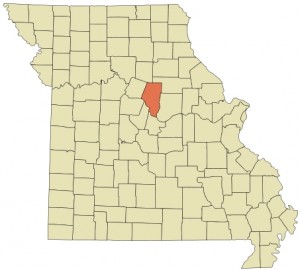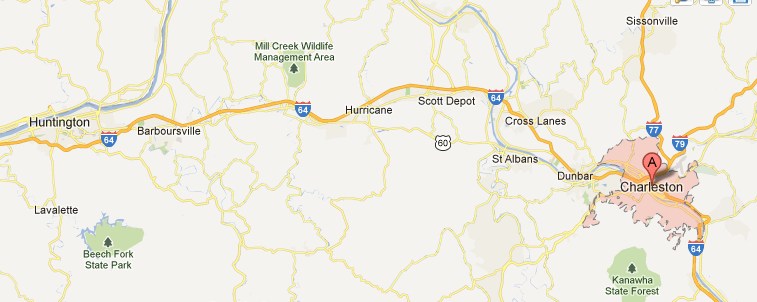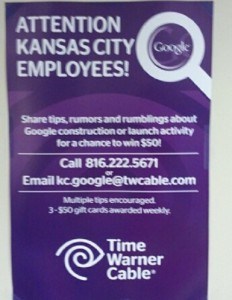[Stop the Cap! will be closely following Google’s experimental gigabit fiber-optic broadband network. We’ll be bringing regular updates about the communities applying, the strategies they are using to attract Google’s attention, what the competition thinks, and the impact of the project on American broadband.]
 Columbia, Missouri is excited about the prospect of being chosen as a test city for Google gigabit broadband.
Columbia, Missouri is excited about the prospect of being chosen as a test city for Google gigabit broadband.
It’s just one of tens of communities seeking to apply for Google’s new experimental fiber to the home network delivering super fast broadband to residents and businesses.
Columbia is the fifth largest city in the state, with 100,000 residents who call the heart of mid-Missouri home. Columbia is a classic college town, supporting the University of Missouri. It’s uniquely known as one of the most-educated communities in the country, with over half of its residents holding college degrees. Columbia residents are quick to embrace new technology, and this drive to adopt the latest and the greatest has fueled interest in Google’s fiber network.
Columbia’s Regional Economic Development, Inc. (REDI), promoting local business and economic development, has been coordinating what to do next. They’ve been joined by ComoFiber, which is working to generate public interest in the project and help devise a strategy to win Google’s attention.

Columbia, Missouri
Mike Brooks, from REDI, said the city has seen a great deal of interest from the community to apply for Google’s plan.
Last week, both groups met to educate the public and start identifying why Columbia poses an attractive place for Google’s project.
Some believe Columbia would be the ideal city to build such a network. ComoFiber explains:
The reasons are numerous, but the biggest reason is really quite simple: Columbia is on the knife’s edge: the sweet spot between big, highly-developed cities and small, under-served towns.
The reason this is so important is because it’s easy to see why Google might want to deploy its fiber in either a big city or a small town, but it’s equally easy to see why they wouldn’t. The big cities have high-tech industry, universities, highly educated populae and other capabilities that allow them to produce the kind of applications and creative products that Google wants to research. On the other hand, major cities already have a great deal of fiber infrastructure, and their broadband prices are generally reasonable. So really, they’re already enabled; adding marginally-faster service to those markets won’t be the kind of sea-change that the plan is designed to study.
ComoFiber compiled a list of strengths from both the “big city” and “small town” perspective:

Columbia/Boone County, Missouri
Columbia as Big City:
- Multiple colleges and universities, including world-class research facilities.
- A major life sciences epicenter. Life-science is perhaps the most data-intensive industry in the world.
- A highly-educated, technically-skilled populace. Thirteenth-most educated in America, to be exact.
- Many high-tech small businesses, including Internet-centric outfits such as Newsy.
- Several major hospitals and health care businesses, including some at the forefront of technological advancement.
- Small-business incubators run in cooperation with universities and the city.
- The world’s foremost journalism school and the Donald W. Reynolds Journalism Institute, which houses a state-of-the-art Technology Testing Center.
- Several existing Internet service providers who can take advantage of this new open network.
- Excellent data backhaul capability due to our position on the I-70 corridor.
- With over 100,000 people, the population is high enough to meet Google’s goal for project scale.
Columbia as Small Town:
- Sub-par broadband performance with high prices.
- Very little existing fiber-to-the-home infrastructure.
- High tariffed rates for enterprise-class data products (T1, DS3, etc.)
- Midrange population density should be a good microcosm for suburbia nationwide.
- Smaller building development (no high-rises) makes infrastructure deployment simpler.
- ”The District” contains the kind of mom-and-pop small-town businesses that can innovate unencumbered by corporate imperatives.
- Frequently listed in “best places to live” compilations, such as that of Money Magazine.
- Location in the heart of middle America sends a powerful symbolic message.
- Low cost of living will be nice for the employees Google will need to move in.
- With only a bit over 100,000 people, the population is low enough not to dwarf Google’s goal for scale.
The incumbent cable operator, Mediacom, can’t understand why there is such excitement over Google’s fiber project.
“Google is going to be in select markets, and it’s kind of a test that they’re rolling out,” Mediacom director of operations Bryan Gann told KOMU-TV in Columbia. “It may be limited to some commercial applications in the beginning.”

Mediacom is Columbia's incumbent cable company
Mediacom doesn’t think most residents have any need for super fast broadband.
“I think when you get up to those higher speeds that fast, it’s a select group that would even be interested in it going at that speed,” Gann said.
Despite that remark, Gann quickly added Mediacom was already providing the fastest broadband access in town. In early February, Mediacom boosted its top broadband speed to 50Mbps, and Gann says the company already has plans to boost that speed to 100Mbps in the future.
“We’re already supposed to go to 100, so we can press on the accelerator anytime we want to,” Gann said.
When a new fiber-based competitor threatens to arrive in town, most cable companies downplay the competitive threat. Mediacom was no exception.
Gann told KOMU Mediacom was used to competition in broadband service and doesn’t see Google Fiber as a threat.
“With the technology that the cable industry put into Columbia, we’re ready to increase our speed to match competition,” Gann said.
[flv]http://www.phillipdampier.com/video/KOMU Columbia Faster Internet May Reach Mid-Missouri 2-16-10.flv[/flv]
KOMU-TV talks about Columbia’s prospects as a chosen city for Google’s new fiber-to-the-home experiment. (2/16/10 – 1 minute)
 Frontier Communications is ready to deliver some customers faster DSL speeds in portions of West Virginia that have, until now, been stuck with 3-6Mbps from the phone company.
Frontier Communications is ready to deliver some customers faster DSL speeds in portions of West Virginia that have, until now, been stuck with 3-6Mbps from the phone company.


 Subscribe
Subscribe









